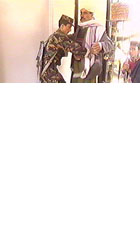
Yemen Option 2004
Distributed by Filmakers Library, 124 East 40th Street, New York, NY 10016; 202-808-4980
Produced by Greg Wilesmith
Director n/a
VHS, color, 35 min.; In English and Arabic with English Subtitles
Sr. High - Adult
Middle Eastern Studies, International Relations, Political Science, History
Date Entered: 11/03/2004
Reviewed by Beatrice R. Pulliam, MS, Library and Information ScienceMark Corcoran, Foreign Correspondent for the Australian Broadcasting Corporation (ABC Television) narrates and serves as interviewer in this documentary. The film gives a fairly optimistic view of Yemen post-September 11 and the U.S.S. Cole bombing attack by Al Qaeda in October 2000. It gives even treatment to moderates, extremist pockets and the Yemen government’s attempts to combat terrorism.
Corcoran interviews Yemeni Ministry officials and Edmund Hull, the former U.S. Ambassador to Yemen and State Department counter-terrorism chief when covering the government’s efforts to stifle tribal conflicts and Al Qaeda terrorist activities within the country. The “Yemen Option” plan includes a “no questions asked” weapons buyback program, prohibition of guns in the capital city of Sana’a and the use of “reformed”, low-risk Al Qaeda members as spokespersons to sustain the current peace. U.S. officials go on the record and commend the initial efforts but remain skeptical about any lasting success. Corcoran also goes into heavy tribal and poor areas in the North and interviews men (old and young) who are very outspoken about America’s “War on Terror” and more sympathetic to Islamic extremists. He balances this with a trip to a men-only political poetry recital attended by moderates. An interview with a California convert studying in Yemen seems a bit hurried; the American student hedges on a question condemning Al Qaeda and Corcoran doesn’t seem interested in pursuing it.
The documentary also highlights the selflessness of Christian missionaries in the tiny, ancient city of Jibla. Three American medical professionals at a Baptist Evangelical run hospital were gunned down by a Muslim extremist in December 2002. Corcoran spends time with Dr. Ken Clezy, an aging surgeon and Australian national who reflects on the relative peace in the city and the work and dedication of his slain colleagues who each had served the area for over 20 years prior to the killings. Footage includes a visit to the gravesite of two of the murdered missionaries. After the killings, the Baptists turned the hospital back over to the government. Clezy returned to continue his work at the hospital even after all other staff were evacuated.
This documentary is compelling in part because it shows something that is not often seen after the initial reporting of a national event: the follow up. It looks at a country dealing with its own, very ugly elements by closing down many fundamentalist centers (in contrast to Pakistan) and attempting to deny Al Qaeda the opportunity to continue to use it as a terrorist base. It also shows some of the fallout, in the form of deepening social problems throughout the country, particularly with those who view Yemen’s antiterrorism efforts as an act of collusion with the U.S. government.